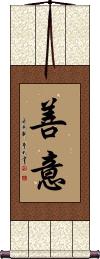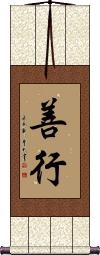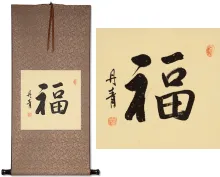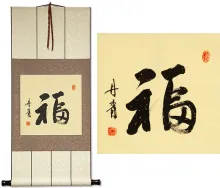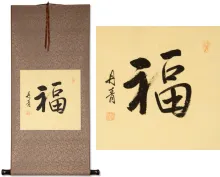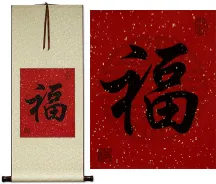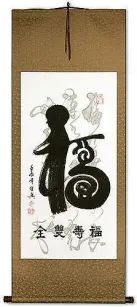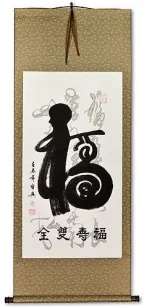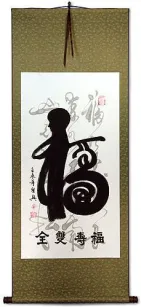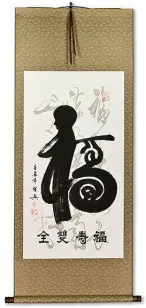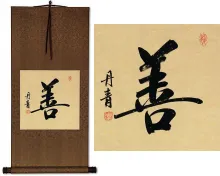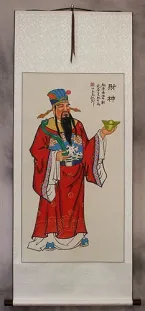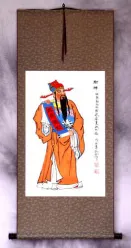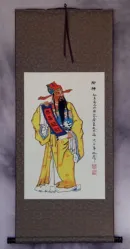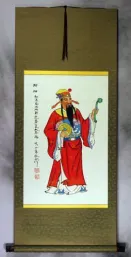Many custom options...
And formats...

Not what you want?
Try other similar-meaning words, fewer words, or just one word.
Good Deeds in Chinese / Japanese...
Buy a Good Deeds calligraphy wall scroll here!
Personalize your custom “Good Deeds” project by clicking the button next to your favorite “Good Deeds” title below...
Good Intentions / Good Will / Good Faith
善意 is a word that means good intentions, goodwill, or to things done in good faith in Chinese, Japanese, and old Korean Hanja.
It's the reason you do good deeds or the desire you have inside yourself to do the right thing.
This can also be translated as benevolence, kindness, virtuous mind, positive mindset, or favorable sense.
善意 is also used in the legal context for things done in good faith (regardless of outcome).
In Japanese, this can be the personal name Yoshi or Yoshii.
Good Conduct
善行 means good actions, good deeds, good conduct, or benevolence.
This can be the given name Yoshiyuki in Japanese.
Doing good is the greatest source of happiness
為善最樂 can be translated as “Doing good is the greatest source of happiness” or “doing good deeds brings the greatest joy.”
The origin is not known but is sometimes used in the context of Buddhism. However, this Chinese proverb or philosophy is a relatively mainstream idea of benevolence.
Hiding in the Leaves - Hagakure
This in-stock artwork might be what you are looking for, and ships right away...
Gallery Price: $65.00
Your Price: $39.88
Gallery Price: $90.00
Your Price: $49.88
Gallery Price: $65.00
Your Price: $39.88
Gallery Price: $65.00
Your Price: $39.88
Good Luck Special Calligraphy Wall Scroll
Discounted Blemished
Gallery Price: $35.00
Your Price: $19.00
Good Luck Special Calligraphy Wall Scroll
Discounted Blemished
Gallery Price: $31.00
Your Price: $17.00
Good Luck Special Calligraphy Wall Scroll
Discounted Blemished
Gallery Price: $31.00
Your Price: $17.00
Good Luck Special Calligraphy Wall Scroll
Discounted Blemished
Gallery Price: $53.00
Your Price: $29.00
Gallery Price: $65.00
Your Price: $39.88
Good Fortune / Prosperity Saint Wall Scroll
Discounted Blemished
Gallery Price: $71.00
Your Price: $39.00
Prosperity / Good Fortune Saint Wall Scroll
Discounted Blemished
Gallery Price: $58.00
Your Price: $32.00
Good Fortune / Prosperity God Wall Scroll
Discounted Blemished
Gallery Price: $53.00
Your Price: $29.00
Gallery Price: $120.00
Your Price: $59.88
Not the results for good deeds that you were looking for?
Below are some entries from our dictionary that may match your good deeds search...
| Characters If shown, 2nd row is Simp. Chinese |
Pronunciation Romanization |
Simple Dictionary Definition |
業 业 see styles |
yè ye4 yeh waza わざ |
More info & calligraphy: Karmadeed; act; work; performance; (personal name) Hajime karman, karma, "action, work, deed"; "moral duty"; "product, result, effect." M.W. The doctrine of the act; deeds and their effects on the character, especially in their relation to succeeding forms of transmigration. The 三業 are thought, word, and deed, each as good, bad, or indifferent. Karma from former lives is 宿業, from present conduct 現業. Karma is moral action that causes future retribution, and either good or evil transmigration. It is also that moral kernel in which each being survives death for further rebirth or metempsychosis. There are categories of 2, 3, 4, 6, and 10; the 六業 are rebirth in the hells, or as animals, hungry ghosts, men, devas, or asuras: v. 六趣. |
五行 see styles |
wǔ xíng wu3 xing2 wu hsing gogyou / gogyo ごぎょう |
More info & calligraphy: Five Elements(1) (See 五大・ごだい・1) the five elements (in Chinese philosophy: wood, fire, earth, metal and water); the five phases; wu xing; (2) {Buddh} five practices of the Bodhisattvas; (3) (See 六信五行) the five pillars of Islam; (surname, given name) Gogyou The five lines of conduct. I. According to the 起信論 Awakening of Faith they are almsgiving; keeping the commandments; patience under insult; zeal or progress; meditation. II. According to the 涅槃經 Nirvana Sutra they are saintly or bodhisattva deeds; arhat, or noble deeds; deva deeds; children's deeds (i. e. normal good deeds of men, devas, and Hinayanists); sickness conditions, e. g. illness, delusion, etc.; — into all these lines of conduct and conditions a Bodhisattva enters. III. The five elements, or tanmātra— wood, fire, earth, metal, and water; or earth, water, ire, air, and ether (or space) as taught by the later Mahāyāna philosophy; idem 五大. |
善行 see styles |
shàn xíng shan4 xing2 shan hsing zenkou / zenko ぜんこう |
More info & calligraphy: Good Conduct(noun - becomes adjective with の) (ant: 悪行) good deed; good conduct; benevolence; (given name) Yoshiyuki practice of good deeds |
福德 see styles |
fú dé fu2 de2 fu te fukutoku |
More info & calligraphy: Fude |
為善最樂 为善最乐 see styles |
wéi shàn zuì lè wei2 shan4 zui4 le4 wei shan tsui le |
More info & calligraphy: Doing good is the greatest source of happiness |
万善 see styles |
manzen まんぜん |
(noun or adjectival noun) all good works; all good deeds; (place-name, surname) Manzen |
三因 see styles |
sān yīn san1 yin1 san yin sanin さんいん |
{Buddh} (See 三因仏性) three causes of Buddha nature; (place-name) Miyori The six "causes" of the Abhidharma Kośa 倶舍論 as reduced to three in the Satyasiddhi śāstra 成實論, i.e. 生因 producing cause, as good or evil deeds cause good or evil karma; 習因 habit cause, e.g. lust breeding lust; 依因 dependent or hypostatic cause, e.g. the six organs 六根 and their objects 六境 causing the cognitions 六識. |
三業 三业 see styles |
sān yè san1 ye4 san yeh sangou / sango さんごう |
{Buddh} (See 身口意) three activities (action, speech and thought) trividha-dvāra. The three conditions, inheritances, or karma, of which there are several groups. (1) Deed, word, thought, 身, 口, 意. (2) (a) Present-1ife happy karma; (6) present-life unhappy karma; (c) 不動 karma of an imperturbable nature. (3) (a) Good; (b) evil; (c) neutral karma. (4) (a) 漏業 Karma of ordinary rebirth; (6) 無漏業 karma of Hīnayāna nirvana; (c) 非漏非無漏 karma of neither, independent of both, Mahāyāna nirvana. (5) (a) Present deeds and their consequences in this life; (b) present deeds and their next life consequences; (c) present deeds and consequences after the next life, There are other groups of three. |
三行 see styles |
sān xíng san1 xing2 san hsing miyuki みゆき |
(g,p) Miyuki Three lines of action that affect karma, i.e. the ten good deeds that cause happy karma; the ten evil deeds that cause unhappy karma; 不動業 or 無動行 karma arising without activity, e.g. meditation on error and its remedy. |
事度 see styles |
shì dù shi4 du4 shih tu jido |
Salvation by observing the five commandments, the ten good deeds, etc. |
二嚴 二严 see styles |
èr yán er4 yan2 erh yen ni gon |
The dual adornment, that of 智慧 wisdom and that of 福德; good deeds, 涅槃經 27. |
二因 see styles |
èr yīn er4 yin1 erh yin niin / nin にいん |
{Buddh} two causes Two causes, of which there are various definitions: (1) 生因 The producing cause (of all good things); and 了因 the revealing or illuminating cause i.e. knowledge, or wisdom. (2) 能生因 The 8th 識 q. v.: the cause that is able to produce all sense and perceptions, also all good and evil; and 方便因 the environmental or adaptive cause, which aids the 8th 識, as water or earth does the seed, etc. (3) 習因 or 同類因 Practice or habit as cause e. g. desire causing desire; and 報因 or 果熟因 the rewarding cause, or fruit-ripening cause, e. g. pleasure or pain caused by good or evil deeds. (4) 正因 Correct or direct cause i.e. the Buddha-nature of all beings; and 緣因 the contributory cause, or enlightenment (see 了因 above) which evolves the 正因 or Buddha-nature by good works. (5) 近因 Immediate or direct cause and 遠因 distant or indirect cause or causes. |
五果 see styles |
wǔ guǒ wu3 guo3 wu kuo goka ごか |
(1) five fruits (peach, Japanese plum, apricot, jujube, Japanese chestnut); (2) (Buddhist term) five types of effect in cause-and-effect relationships; (3) (Buddhist term) five effects of ignorance and formations on one's current life The five fruits, or effects; there are various groups, e. g. I. (1) 異熟果 fruit ripening divergently, e. g. pleasure and goodness are in different categories; present organs accord in pain or pleasure with their past good or evil deeds; (2) 等流果 fruit of the same order, e. g. goodness reborn from previous goodness; (3) 土用果 present position and function fruit, the rewards of moral merit in previous lives; (4) 增上果 superior fruit, or position arising from previous earnest endeavor and superior capacity: (5) 離繋果 fruit of freedom from all bonds, nirvana fruit. II. Fruit, or rebirth: (1) 識 conception (viewed psychologically); (2) 名色 formation mental and physical; (3) 六處 the six organs of perception complete; (4) 觸 their birth and contact with the world; (5) 受 consciousness. III. Five orders of fruit, with stones, pips, shells (as nuts), chaff-like (as pine seeds), and with pods. |
人因 see styles |
rén yīn ren2 yin1 jen yin ninin |
The causative influences for being reborn as a human being, i.e. a good life. Those in positions of honour have obtained them by former deeds of benevolence, reverence to Buddhas and monks, patience, humility, devotion to the sutras, charity, morality, zeal and exhortation, obedience, loyalty - hence they have obtained affluence, long life, and are held in high regard. Those in mean condition are thus born because of the opposite characteristics in previous incarnation. |
修善 see styles |
xiū shàn xiu1 shan4 hsiu shan shuzen; shuuzen / shuzen; shuzen しゅぜん; しゅうぜん |
(noun/participle) (しゅぜん is a Buddhist term) accumulating good deeds; doing good; (personal name) Nobuyoshi To cultivate goodness; the goodness that is cultivated, in contrast with natural goodness. |
八憍 see styles |
bā jiāo ba1 jiao1 pa chiao hakkyō |
The eight kinds of pride, or arrogance, resulting in domineering: because of strength; of clan, or name; of wealth; of independence, or position; of years, or age; of cleverness, or wisdom; of good or charitable deeds; of good looks. Of these, eight birds are named as types: 鴟梟 two kinds of owl, eagle, vulture, crow, magpie, pigeon, wagtail. |
六因 see styles |
liù yīn liu4 yin1 liu yin rokuin |
The six causations of the 六位 six stages of Bodhisattva development, q. v. Also, the sixfold division of causes of the Vaibhāṣikas (cf. Keith, 177-8); every phenomenon depends upon the union of 因 primary cause and 緣 conditional or environmental cause; and of the 因 there are six kinds: (1) 能作因 karaṇahetu, effective causes of two kinds: 與力因 empowering cause, as the earth empowers plant growth, and 不障因 non-resistant cause, as space does not resist, i. e. active and passive causes; (2) 倶有因 sahabhūhetu, co-operative causes, as the four elements 四大 in nature, not one of which can be omitted; (3) 同類因 sabhāgahetu, causes of the same kind as the effect, good producing good, etc.; (4) 相應因 saṃprayuktahetu, mutual responsive or associated causes, e. g. mind and mental conditions, subject with object; Keith gives 'faith and intelligence'; similar to (2); (5) 遍行因 sarvatragahetu, universal or omnipresent cause, i. e. of illusion, as of false views affecting every act; it resembles (3) but is confined to delusion; (6) 異熟因 vipākahetu, differental fruition, i. e. the effect different from the cause, as the hells are from evil deeds. |
勧善 see styles |
kanzen かんぜん |
(See 勧善懲悪) rewarding good deeds |
善事 see styles |
shàn shì shan4 shi4 shan shih zenji ぜんじ |
good deeds good thing; good deed good deed |
善根 see styles |
shàn gēn shan4 gen1 shan ken zenkon ぜんこん |
good deeds; charity; (surname) Yoshine wholesome roots |
善業 善业 see styles |
shàn yè shan4 ye4 shan yeh zengou / zengo ぜんごう |
(ant: 悪業) good deeds good actions |
四行 see styles |
sì xíng si4 xing2 ssu hsing shigyō |
The four disciplinary processes: enlightenment; good deeds; wisdom; and worship. |
宿善 see styles |
sù shàn su4 shan4 su shan sukuzen |
Good deeds done in previous existence. |
小草 see styles |
xiǎo cǎo xiao3 cao3 hsiao ts`ao hsiao tsao ogusa おぐさ |
(surname) Ogusa Smaller herbs, those who keep the five commandments and do the ten good deeds, thereby attaining to rebirth as men or devas, v. 三草二木. |
果報 果报 see styles |
guǒ bào guo3 bao4 kuo pao kahou / kaho かほう |
karma; preordained fate (Buddhism) (noun or adjectival noun) (1) good fortune; luck; happiness; (noun or adjectival noun) (2) {Buddh} (See 業・ごう・1) vipaka (retribution); (female given name) Kaho 異熟 Retribution for good or evil deeds, implying that different conditions in this (or any) life are the variant ripenings, or fruit, of seed sown in previous life or lives. |
淨業 淨业 see styles |
jìng yè jing4 ye4 ching yeh jōgō |
Good karma; also the deeds which lead to birth in the Pure Land. |
留難 留难 see styles |
liú nàn liu2 nan4 liu nan runan |
to make something difficult; to create obstacles The difficulty of one's good deeds being hindered by evil spirits. |
白黑 see styles |
bái hēi bai2 hei1 pai hei byakukoku |
white and dark, e. g. 白黑業 good and evil deeds, or karma. |
福因 see styles |
fú yīn fu2 yin1 fu yin fukuin |
That which causes or gives rise to blessing, i.e. all good deeds. |
積善 积善 see styles |
jī shàn ji1 shan4 chi shan sekizen せきぜん |
accumulation of good deeds; (surname) Tsumiyoshi to accumulate virtue |
Click here for more good deeds results from our dictionary
The following table may be helpful for those studying Chinese or Japanese...
| Title | Characters | Romaji (Romanized Japanese) | Various forms of Romanized Chinese | |
| Good Intentions Good Will Good Faith | 善意 | zen i / zeni | shàn yì / shan4 yi4 / shan yi / shanyi | shan i / shani |
| Good Conduct | 善行 | zenkou / zenko | shàn xíng shan4 xing2 shan xing shanxing | shan hsing shanhsing |
| Doing good is the greatest source of happiness | 為善最樂 为善最乐 | wéi shàn zuì lè wei2 shan4 zui4 le4 wei shan zui le weishanzuile | wei shan tsui le weishantsuile |
|
| Hiding in the Leaves - Hagakure | 葉隠れ | hagakure | ||
| In some entries above you will see that characters have different versions above and below a line. In these cases, the characters above the line are Traditional Chinese, while the ones below are Simplified Chinese. | ||||
Successful Chinese Character and Japanese Kanji calligraphy searches within the last few hours...
